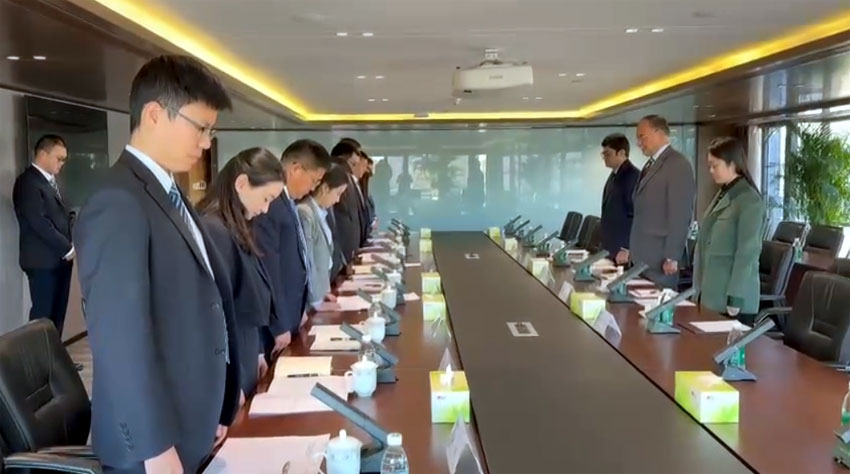
BEIJING: Minister for Planning, Development and Special Initiatives, Prof. Ahsan Iqbal said that Pakistan and China will jointly elevate China Pakistan Economic Corridor (CPEC) into a beacon of high-quality development, not just for the two nations but for the region and the world.
Inaugurating the opening ceremony of high level workshop organised by China’s National Commission for Development and Reforms (NDRC) on “Building an upgraded Version of CPEC”, he said that over the past decade, CPEC has proven to be a game-changer for Pakistan.
Projects that once existed only in blueprints have materialized into transformative infrastructure, energy
solutions, and digital connectivity, bringing economic vitality and improved livelihoods.
Sharing details of projects in energy sector, he said that through 17 completed projects, 8,904 MW of power has been added to the national grid, alleviating energy shortages and driving industrial growth.
The once-untapped coal reserves of Thar are cheapest source of fuel and provide our energy independence, he added.
Regarding the infrastructure projects, he said over 888 kilometers of motorways and highways have been
completed, with another 853 kilometers under construction, bridging communities and fostering economic integration.
He said that the jewel of CPEC, Gwadar, is evolving into a smart port city and a hub of regional connectivity, unlocking unprecedented opportunities
for trade and development in future.
Highlighting digital connectivity, he said that the fiber optic cable laid under CPEC is Pakistan’s new information highway, enabling digital transformation, bridging the connectivity gap, and positioning
Pakistan to leverage the opportunities of the digital age.
Ahsan Iqbal pointed out that CPEC projects have also created more than 200,000 jobs, directly benefiting
local communities and empowering thousands of households across Pakistan.
This is not just an economic initiative but a transformational force driving social and economic upliftment across the country. Additionally, social uplift projects, supported by our Chinese partners, have
significantly enhanced education, healthcare, and livelihoods in underserved areas, underscoring CPEC’s
role as a people-centric initiative, he added.
He opined that one of the most inspiring aspects of the Pakistan-China partnership is China’s
spirit of sharing its development experience.
This embodies the principle of “teach your brother how to catch fish.” Instead of providing short-term solutions, China has consistently empowered Pakistan to learn, grow, and implement sustainable solutions for its own development, he added.
The minister said that the modernization and reform of the Chinese economy, which lifted over 800 million people out of poverty, is a remarkable feat in human history. This transformative journey offers invaluable lessons for Pakistan.
From rural development to urban modernization, from industrial policy to technological advancement, China’s experience is a treasure trove of knowledge.
He expressed the confidence that this workshop provides the participants with a unique opportunity to not only learn from these experiences but also to adapt them to the Pakistani environment.
“Our task is to develop a framework that draws on Chinese expertise while incorporating Pakistani characteristics, ensuring that our policies and strategies are grounded in our unique realities and aspirations. As we enter the second decade of CPEC, our vision expands to align with emerging global and regional priorities.”
He said that in July last year, China’s Vice Premier He Lifeng, representing President Xi Jinping, unveiled the roadmap for the next phase —featuring five new corridors which were Growth Corridor, Livelihood Corridor, Green Corridor, Innovation Corridor and Opening-Up/Regional Connectivity Corridor.
These corridors are a natural extension of Pakistan’s 5Es Framework—Exports, E-Pakistan, Environment, Energy, and Equity & Empowerment.
Together, they embody the spirit of the Belt and Road Initiative’s philosophy: “Planning together, building together, and benefiting together.”
He said that in today’s complex and evolving geopolitical landscape, the Pakistan-China partnership is more important than ever. The challenges of new global alignments and shifting economic and security dynamics demand that we
deepen our collaboration and reaffirm our unwavering solidarity.
He said that Pakistan is committed to working closely with China to expand our cooperation into emerging areas such as technology, green development, regional connectivity, and economic resilience.
Together, we can not only navigate these challenges but also transform them into opportunities for mutual benefit and regional stability.
He said that this seminar is not just a platform for exchanging ideas—it is a forum for shaping the future.
Together, Pakistan and China will rise
higher, transforming challenges into
opportunities and turning bold visions into enduring realities, he added.
The minister extended his heartfelt gratitude to the National Development and Reform Commission (NDRC) for their steadfast efforts in making CPEC a cornerstone of regional connectivity and economic prosperity.
Vice Chairman of NDRC, Zhao Chenxin on this occasion said, Pakistan and China are Iron Brothers. China will support Pakistan to become an advanced economy. Thirty senior officials are attending 14 day workshop to discuss with Chinese counterparts the framework and plans for CPEC 2.0 on the invitation of NDRC.